Evo's Cage
The pessimistic article below presents the profoundly anti-democratic state/corporate/finance pressures directed at the Bolivian government-elect in terms stark enough I thought it justified an extended excerpt.
[Daphne Eviatar, “Bolivia's Home-Grown President,” The Nation (web only), December 21, 2005]
...almost every major oil company--including Spain's Repsol, British Gas, ExxonMobil and Texas-based Vintage Oil--has already threatened to bring a claim in international arbitration against Bolivia. And if Morales nationalizes the industry, under the terms of the bilateral investment treaties between Bolivia and the companies' home countries, they could sue--in private, closed-door arbitration, without the safeguards normally provided by publicly appointed judges in an international court--for not only the approximately $3.5 billion private companies have already invested in the natural gas industry here but also for the loss of expected profits, which could total tens of billions of dollars. For a country like Bolivia, whose annual revenues are only a little more than $2 billion a year, that's no small threat. It's for that reason--and a host of other ways in which the United States, the World Bank, the IMF and the Inter-American Development Bank can threaten to pull the noose tight around Bolivia's highly indebted neck--that an Evo Morales presidency may well remain largely a symbolic victory.
The threat of lawsuits by up to thirty major oil companies will thwart any new government's ability to significantly change the current system. Nor can Morales do much to address the plight of coca farmers: Although he has said he'll campaign to decriminalize the coca leaf on an international level, he knows he can do little to change the system at home. A refusal to continue the coca eradication campaign would require the United States, under US law, to vote against any Bolivian application for loans or grants from the World Bank, IMF or Inter-American Development Bank--all critical to Bolivia's ability to finance its debt and fuel its economy. In effect, any attempt by the newly elected president to do exactly what Bolivians just elected him to do would marshal the forces of the international financial community against the Bolivian government and doom the country's already-precarious financial stability.
"It's OK, there are plenty of other countries, like China, that will be willing to help us," Morales told me on a rare break from campaigning shortly before the election. Countries like China and Venezuela may be exactly where he turns. But many on the left in Bolivia think he's not likely to buck the American and international business pressure and will stick with a modestly reformed version of the status quo. That won't satisfy many of the more radical Aymara activists, who are intent on breathing real life into the powerful symbols of the indigenous movement.
"The identity of people and of communities has become a very important issue in the country," Pablo Mamani, a sociologist who teaches at the public universities in El Alto and La Paz, said. "The Aymara will all vote for Evo, because we want to see an Aymara in the presidency. But if he is not really allowed to govern, the militant social organizations can create a scenario of very severe conflict between the people and the state."
The nation's right-wing movements, particularly those concentrated in Santa Cruz, Bolivia's wealthiest province where the energy and agricultural export businesses are based, may well encourage that. "Bolivia is facing a big problem," Carlos Rojas, the burly president of an association of agriculture producers, told me from his Santa Cruz office. "We don't accept Mr. Morales's policy about land," he said, referring to Morales's support for redistribution of large idle estates, most of which are concentrated in Santa Cruz. "We will have a conflict with him.... The only way for the country to move up and get out of poverty is by working, every day and all the time. If the social movements go and block the roads, we cannot work. We believe it's important to give Mr. Morales the opportunity to work for this country. But if he's not effective, he's going to be out--probably before the end of his term."
In fact, some Bolivians are already planning on that. "We believe MAS (The Movement Towards Socialism, Morales's party) won't change anything," said Abraham Delgado Mancilla, a soft-spoken and serious 28-year-old law student and Aymara Indian who helped organize the massive protests that ultimately brought down the last two Bolivian presidents. "The state doesn't serve us with this system," he told me as we walked through the packed streets of El Alto, an impoverished, makeshift city of home-made brick buildings built high into the Andes that rise above La Paz, where Mancilla lives and continues to organize students and neighbors. "So we must move forward. What happens in Bolivia is twenty years of reforms, and nothing changes. We're still poor. The only road to solving poverty is by nationalization and radical redistribution of land," he said, growing more animated. "Evo will not be able to do what he says. His programs will change nothing. We're waiting for him to fail. And if he does, the people will come out with even more force," he said. I asked him what that would mean. "I think what's going to happen is there will be a civil war."



0 Comments:
Post a Comment
<< Home